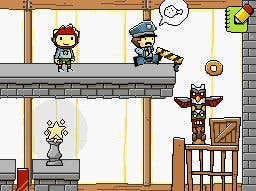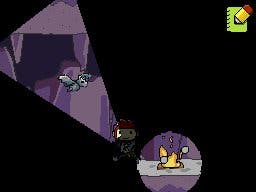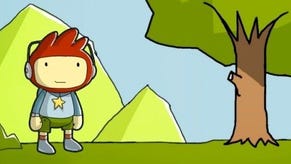Scribblenauts
Word up.
So that's what 5th Cell is doing right now, with a team of around twenty people. "We're all going through dictionaries," says creative director Jeremiah Slaczka. "We have people coming up with the words, people coming up with the art, people coming up with the database entries." And, crucially, how big will the finished database be? Slaczka laughs. "If you can write it, it will be in the game."
"It's hard to give people a sense of the scope of the game," admits Cox. "And people are sceptical: they think we'll use the same assets for lion and tiger and leopard, say, but we won't. We've got different art and different properties for all of those. People are going to be genuinely surprised by how deep the dictionary goes."
It feels like a trick of some sort, particularly given how confident the team seems, but 5th Cell assures us they're not procedurally generating content - how could they be? - or outsourcing the whole process to some slave labour camp in China, where orphans spend their day leafing through encyclopaedias and dictionaries, suffering paper cuts and early-onset tendonitis for a dollar a day.
However they're doing it, it seems to be working. As a test, we ask if Scribblenauts' dictionary has something as obscure as a chafing dish in it - as you'll know from Hot Shots, that's a traditional serving piece used at brunches to keep food warm. Within minutes, Cox has emailed us a screenshot of it. "The chafing dish has been in for a long time," he laughs. "We're into the specialist area right now - if you're a palaeontologist and you know some ridiculously obscure kind of dinosaur, that's what we're putting in at the moment, as we've done all the main ones."

Of course, even if the dictionary is as good as 5th Cell says it is - and the developers are winningly confident on this front - won't the game be a nightmare to balance? How do you create challenges in which the player can respond by doing absolutely anything at all? Rather than fearing such an eventuality, Slaczka seems to actually relish it. "We're well aware that people will be able to do things we hadn't even thought of. Just the other day, in the tree level, somebody wrote 'anvil', which doesn't seem like much help. But then they wrote 'glue', and stuck the glue to the anvil, and then stuck the anvil to the Starite, and it pulled it down out of the tree. I would've never thought to do that before, and we didn't program it, but because the objects all have physical qualities that make sense, the game can decide whether a solution's going to work. The system works by itself, and we don't have to worry about it."
With two different types of challenge available - simple casual scenarios with a single goal, and then more involved hardcore puzzles which feature enemies, platforming, and larger maps - Scribblenauts should provide plenty of thoughtful distraction to go along with its astonishing premise. "You'll have to contain things, escape from things, maybe cook things, and that sort of stuff," says Cox. "The fun of the game lies in interaction: spawning a bicycle and riding around on it is cool, but then you put a ramp up, and then put a rocket on it. That's cooler."

But there's no point hiding the fact that as much as Scribblenauts is a game about increasingly complex puzzles, it's also about the eternal simplicity of magic: of coming up with the most obscure object imaginable, and seeing if it's actually lodged somewhere inside that tiny game card - and then, of course, seeing how it behaves when you shove a rocket onto it. That's the player's real long-term challenge, perhaps: reverse-engineering 5th Cell's database, and sounding out the limitations of the system, trying to find that elusive something the developers didn't expect you to think of. And if that sounds like your kind of thing, you can start by crossing beavers, footballs, ladders, chafing dishes, and all the more obscure dinosaurs off your list already. Cox and Slaczka already have them covered.
Scribblenauts is due out for the DS in autumn 2009.



.png?width=291&height=164&fit=crop&quality=80&format=jpg&auto=webp)




.jpg?width=291&height=164&fit=crop&quality=80&format=jpg&auto=webp)
